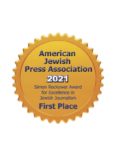“What’s next will be positive and we’re excited about it,” said Ethan Roberts, the government affairs director at the Jewish Community Relations Council of Minnesota and the Dakotas. “We know that we’ve been heard.
“It was never their intention to submit a final product that wouldn’t have it in the standards, but they didn’t mention to anyone that it might be added back in.”
MDE’s Doug Paulson, the director of academic standards and instruction effectiveness, and Filiz Yargici, the social studies specialist, met with Roberts and Alejandro Baer, the director of the Center for Holocaust and Genocide Studies at the University of Minnesota, JCRC Executive Director Steve Hunegs, George Dalbo, and JCRC board member Amy Walstien on Friday, Dec. 18. At a community Zoom meeting on Dec. 21 Roberts shared what has been agreed to between the MDE, JCRC, and the CHGS:
- MDE is committed to including Holocaust and Genocide Studies in its second draft of the proposed social studies standards, which will be released around February 17th.
- References to the Holocaust and Genocide Studies in the second draft will be stronger than current standards, including a new benchmark for 8th grade and high school dedicated to the Holocaust and other contemporary genocides.
- MDE has asked the Center and the Center has agreed to serve as an expert reviewer of the social studies standards as they relate to Holocaust and Genocide Studies. The Center and Dalbo, consultant to the JCRC and Ph.D. Student and Graduate Instructor with the University of Minnesota, Department of Curriculum and Instruction will also be actively consulted with during the revisions process.
- MDE has asked and the JCRC has agreed to host a targeted feedback session with MDE to discuss the second draft as it relates to Holocaust and Genocide studies.
Dalbo said that the final 2011 standards document was 150 pages, while this first of three drafts was only 30 – leaving plenty of opportunities to get the benchmarks related to the Holocaust and genocide.
“They made it clear that what was released was a draft meant to highlight 22 standards, but not the benchmarks,” Dalbo said. “That is ongoing. But to meet the deadline, released an incomplete draft that left out tons of content. That will be brought back in as it’s revised. We hope it’s not just the six references – including 2 new benchmarks – but to identify more places to include references to Holocaust and genocide.”
Below are the proposed changes and new recommendations for standards. The changes are underlined, and the numbers reference grade-level, subject matter area, and benchmark number:
- 18.9.3 Describe the response of the world community to human rights violations, including the Holocaust and genocides, and efforts to how to think about new awareness of Human Rights.
- 19.9.2 Analyze two or more conflicting narratives about global conflict, considering how different individuals, communities, or nations have presented and narrated global conflicts, such as World War II and the Holocaust, the Korean War, or the Vietnam War.
- 20.9.6 Apply multiple historical perspectives and historical thinking skills to propose a viable solution to a pressing economic, environmental, or social issue, such as failing social security, economic inequalities, the national debt, oil dependence, water shortages, global climate change, pandemics, pollution, global terrorism, genocide and mass violence, poverty, and immigration.
- 21.8.1 Compare and contrast the development of diasporic communities throughout the world due to regional conflicts, genocide and mass violence, changing international labor demands and environmental factors.
- 22.8.NEW Examine the Holocaust, genocides, and other cases of mass violence in the 20th and 21st centuries, and analyze how individuals, groups, and societies around the world have been affected by genocide and mass violence, including communities resettled in Minnesota.
- 22.9.NEW Examine the histories and legacies of the Holocaust, genocides, and mass violence perpetrated against groups of people in the 20th and 21st centuries, and analyze the local, national, and international responses to the Holocaust, genocide, and mass violence.
Joe Eggers, the research and outreach coordinator for the CHGS, said that getting teachers the materials and information they need is crucial.
“We know that teachers are interested in talking about the Holocaust and genocide in the classroom, but often they are feeling that they don’t know enough and don’t have access to the resources,” he said. “We can help prepare them. Even with the standards connecting with the teachers and building up relationships are critical.”
One of the questions that came up at Monday’s JCRC meeting was how the benchmarks related to the Holocaust and genocide were left out altogether.
“It wasn’t malicious or with ill-intent,” Eggers said. “When they are doing a revision, it’s a complete overhaul of the standards in the state. It was a fairly major oversight and they have clearly made work for themselves, but at the same time, we know the language will be stronger.”
Said Laura Zelle, the director of Tolerance Minnesota: “We’ve been assured that our objective will be met.”
This piece received 1st Place in the category Award for Excellence in Writing About Education Reporting from the American Jewish Press Association at the 40th annual Simon Rockower Awards for Excellence in Jewish Journalism.
This piece received 3rd place in the category of Best Continuing Coverage in the 2020 Minnesota Society of Professional Journalists Page One Awards.


















